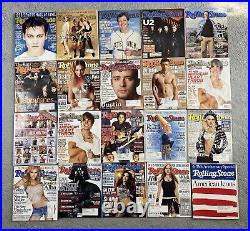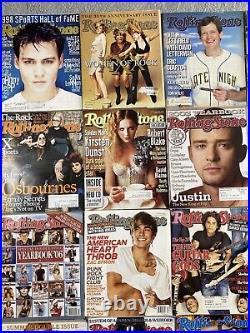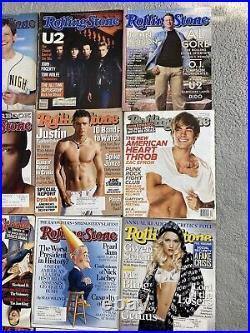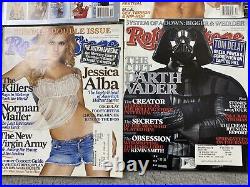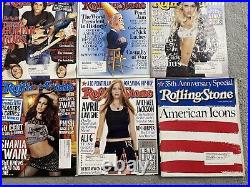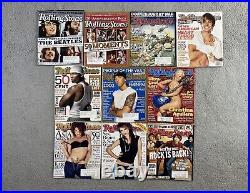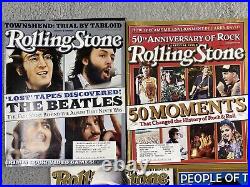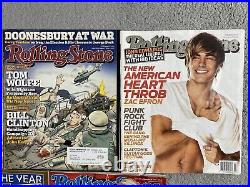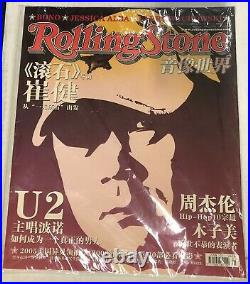
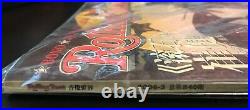
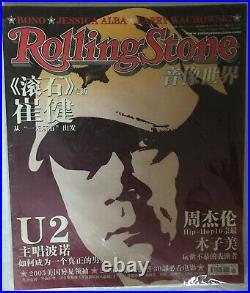
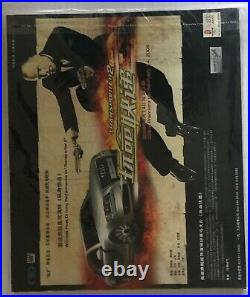

BANNED ROLLING STONE Magazine – Chinese issue #1. This magazine was banned by the CCP. CONDITION: NM, Still Sealed. There was no issue number 2, or any other issue. LA TIMES STAFF WRITER. Rolling Stone has hit a wall. The rock’n’ roll publication entered the Chinese market early this month with a huge splash, including billboard advertisements, on Wednesday, regulators said they would not allow it to publish a second issue. Authorities have been cracking down on the media. The editor of the Beijing News was sacked in December, and the well-regarded weekly supplement Freezing Point, which closed in January, has resumed publication with a new and presumably more cooperative editor. Articles in the first Chinese edition of Rolling Stone about a rock star associated with the 1989 Tiananmen Square protests and a blogger who wrote about her sex life pushed the limits of what is permissible. But the case appears to be more about a clash between the magazine’s brash business strategy and regulators keen to show who is boss. China often depends on a patina of legality that allows companies or individuals to get things done while ensuring that those in power don’t lose face. Push things too far, however, and you risk a backlash. “They didn’t go through the proper procedure, ” said Chen Li, director of the newspaper and magazine department of the Shanghai Press and Publishing Administration, where Rolling Stone was published, under the guise of an existing Chinese magazine. There will be no future Rolling Stone content in this magazine. There’s no such thing as’Rolling Stone. The publication’s editor challenged that view, and some industry experts said it was possible the magazine could agree to tone down its articles and downplay its English name to keep publishing. “I can tell you with absolute certainty, it’s not true, ” said Hao Fang, chief editor of Rolling Stone China. The second issue of our magazine should be on newsstands in April. China is extremely sensitive about issues related to media content and the use of foreign names, befitting a government that long considered the media a lapdog rather than a watchdog. Propagandists referred to media as the “throat and tongue” of the Communist Party. In many ways, Rolling Stone didn’t do much different from other foreign publications trying to enter the world’s most populous market, essentially working within the shell of an existing Chinese publication. Beijing has not issued licenses to foreign magazines for several years. So with the front door blocked, many foreign magazines have found a side entrance. A common practice is to find a local publication and strike a deal so it publishes significant amounts of foreign material, albeit after receiving government approval, then gradually strengthen its international identity over time. Conde Nast, for instance, linked with China Pictorial last year to release Chinese Vogue. And Hearst, working through China’s Trends Group, launched a Chinese Cosmopolitan in 1998 and Harper’s Bazaar in 2001. In Rolling Stone’s case, the existing publication was Audio Visual World. Who is not bending the rules, Chinese companies or otherwise? Said Xiao Qiang, director of the China Internet Project at UC Berkeley. Everyone is doing it. The problem, industry insiders said, was that Rolling Stone jumped into the market in a bigger, brasher way than others did with its 144-page first issue, which has the look and feel of its U. Rolling Stone crossed several red lines, according to sources familiar with regulators’ displeasure. More than half the content in the first edition is translated from the U. Edition, with articles about filmmakers Michael Moore and George Clooney and the late writer Hunter S. Thompson, yet it never received formal approval from the government. It also ignored requirements that the publication’s original Chinese name be printed in large type on the cover with its foreign name smaller and less prominent. In its first issue, Rolling Stone splashed its English name across the front in far larger type than its official Chinese title. Rolling Stone also reportedly rankled Chinese censors with a cover story about Cui Jian, the father of Chinese rock and roll. Cui played in Tiananmen Square in 1989, with his most famous song, “Nothing to My Name, ” emerging as something of an anthem for protesters. “Let us join together in the East to create a legend that will be worthy of this age, ” editor Hao wrote in Rolling Stone China’s opening editorial. It ran a feature about Mu Zimei, a controversial blogger who wrote extensively about her sex life until her site was closed down by censors. “Rolling Stone was quite tricky, ” said one executive in the industry who spoke on condition of anonymity, citing continuing dealings with regulators. But they got nailed. The content was well beyond what the Propaganda Department could tolerate, aside from their not pretending to follow the rules. Magazine publishing has been doing well in China, in line with its booming economy. Philip Qu, an attorney with TransAsia Lawyers in Beijing, said Chinese regulators in recent years have encouraged education, science and technology magazines, while discouraging general interest, lifestyle and pop music titles. If they believe something is too aggressive that challenges their authority, they will show their real power by stopping it. Yin Lijin in The Times’ Beijing Bureau contributed to this report. This item is in the category “Books & Magazines\Magazines”. The seller is “vintagerockmag” and is located in this country: US. This item can be shipped worldwide.
- Country/Region of Manufacture: United States
- Issue Number: 1
- Publication Name: Rolling Stone
- Publication Frequency: Monthly
- Publication Month: March
- Publication Year: 2006
- Language: Chinese
- Genre: Music




